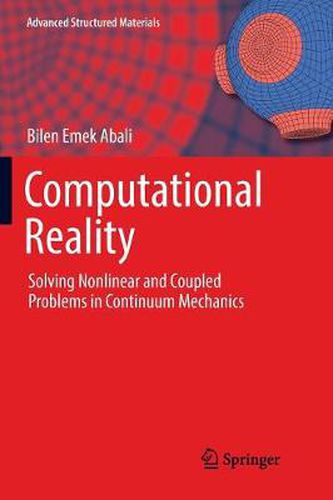Readings Newsletter
Become a Readings Member to make your shopping experience even easier.
Sign in or sign up for free!
You’re not far away from qualifying for FREE standard shipping within Australia
You’ve qualified for FREE standard shipping within Australia
The cart is loading…






This title is printed to order. This book may have been self-published. If so, we cannot guarantee the quality of the content. In the main most books will have gone through the editing process however some may not. We therefore suggest that you be aware of this before ordering this book. If in doubt check either the author or publisher’s details as we are unable to accept any returns unless they are faulty. Please contact us if you have any questions.
This book presents the theory of continuum mechanics for mechanical, thermodynamical, and electrodynamical systems. It shows how to obtain governing equations and it applies them by computing the reality. It uses only open-source codes developed under the FEniCS project and includes codes for 20 engineering applications from mechanics, fluid dynamics, applied thermodynamics, and electromagnetism. Moreover, it derives and utilizes the constitutive equations including coupling terms, which allow to compute multiphysics problems by incorporating interactions between primitive variables, namely, motion, temperature, and electromagnetic fields.
An engineering system is described by the primitive variables satisfying field equations that are partial differential equations in space and time. The field equations are mostly coupled and nonlinear, in other words, difficult to solve. In order to solve the coupled, nonlinear system of partial differential equations, the book uses a novel collection of open-source packages developed under the FEniCS project. All primitive variables are solved at once in a fully coupled fashion by using finite difference method in time and finite element method in space.
$9.00 standard shipping within Australia
FREE standard shipping within Australia for orders over $100.00
Express & International shipping calculated at checkout
This title is printed to order. This book may have been self-published. If so, we cannot guarantee the quality of the content. In the main most books will have gone through the editing process however some may not. We therefore suggest that you be aware of this before ordering this book. If in doubt check either the author or publisher’s details as we are unable to accept any returns unless they are faulty. Please contact us if you have any questions.
This book presents the theory of continuum mechanics for mechanical, thermodynamical, and electrodynamical systems. It shows how to obtain governing equations and it applies them by computing the reality. It uses only open-source codes developed under the FEniCS project and includes codes for 20 engineering applications from mechanics, fluid dynamics, applied thermodynamics, and electromagnetism. Moreover, it derives and utilizes the constitutive equations including coupling terms, which allow to compute multiphysics problems by incorporating interactions between primitive variables, namely, motion, temperature, and electromagnetic fields.
An engineering system is described by the primitive variables satisfying field equations that are partial differential equations in space and time. The field equations are mostly coupled and nonlinear, in other words, difficult to solve. In order to solve the coupled, nonlinear system of partial differential equations, the book uses a novel collection of open-source packages developed under the FEniCS project. All primitive variables are solved at once in a fully coupled fashion by using finite difference method in time and finite element method in space.